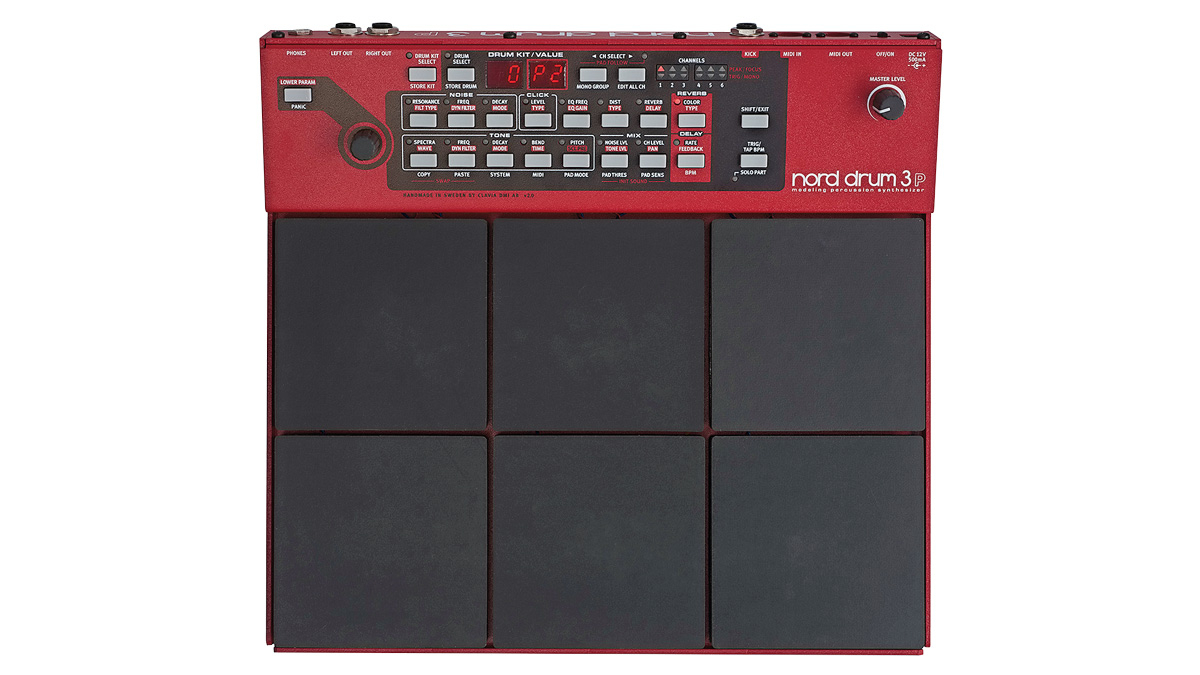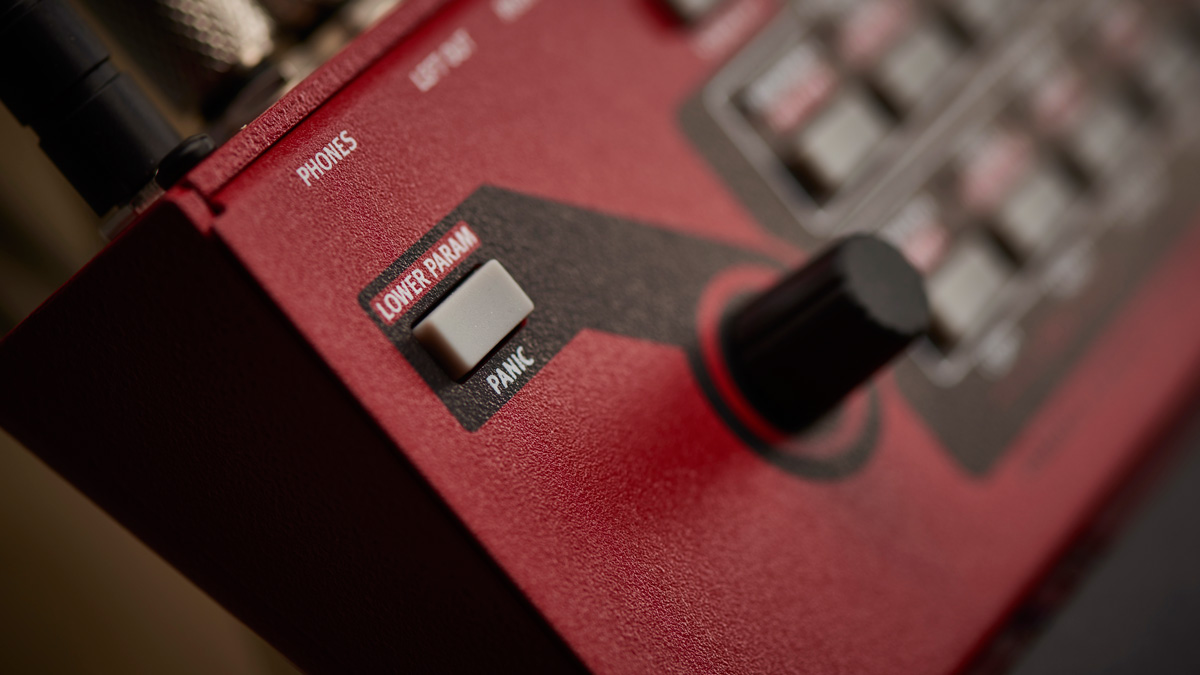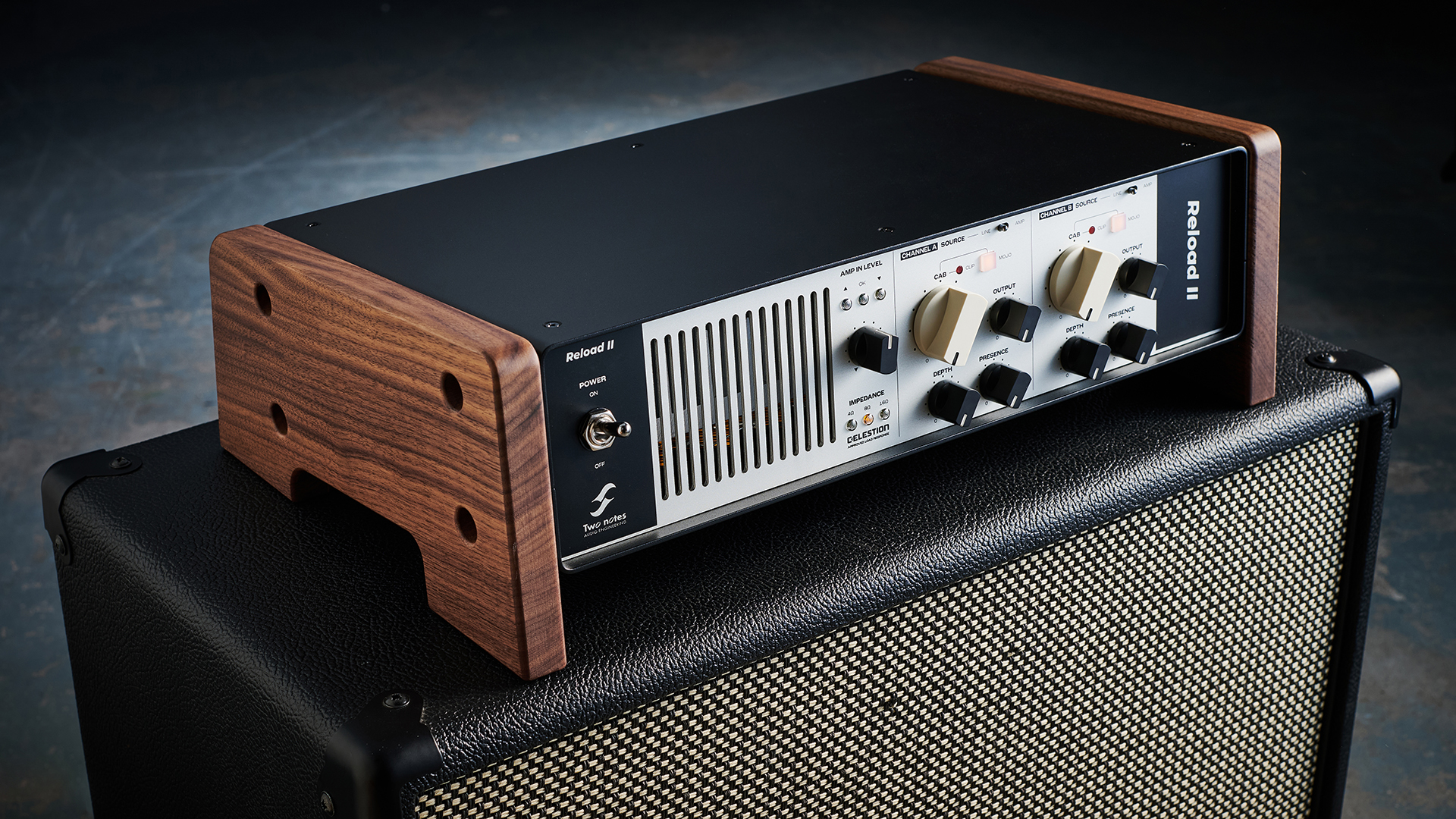MusicRadar Verdict
The integrated pads combined with sequencing in the Nord Beat app make this the ideal do-it-all drum tool.
Pros
- +
Integrated pads are long overdue. Small, compact gigable size and tough chassis.
Cons
- -
3.5mm headphone jack isn't the most flexible option – a 1/4-inch jack would have been preferable.
MusicRadar's got your back

Nord Drum 3P

Nord Drum 3P
It can often be said that if you lust after something for a long time, when you finally get the chance to meet the object of your affection you'll be sorely let down.
This was our worry when the Nord Drum 3P came into the office for review. We hadn't had much time with its previous incarnations, but the brief time we did have, we instantly loved its sound.
So when the third iteration of Clavia's beatbox made its debut at Musikmesse 2016, we knew we had to get our hands on one for a closer look. The big surprise at the launch was the introduction of the 3P. No guesses as to what the P stands for, as Clavia had only gone and welded the pads to the module! The Nord Drum feels like it is no longer a sound module first with pads available as an optional extra; it now looks to be a fully-fledged instrument in its own right.
Our initial thoughts straight out of the box were that of surprise - the unit is much smaller than the box would have you believe. The 3P's solid metal chassis comes in at just under 30cm in both width and depth and, despite the premium construction materials deployed, it only weighs a smidgen over 4lbs.
The 3P offers the perfect tonic to the norm. That's not to say you couldn't whip up an 808 kick on it.
The unit is wafer thin and those of you familiar with the previous Nord Drums will recognise the pad section of the 3P looks suspiciously similar to the Nord Pad. At this point, if we were to compare it to the likes of Roland's SPD-SX and the Alesis Samplepad Pro, you could probably fit two 3Ps inside each of its competitors.
For the uninitiated, the integrated multipad, much like the standalone unit, is super responsive and, by adjusting the pads sensitivity, there will be something to suit players of all types. The density and feel of the pads is reminiscent to that of your average rubber-mounted-on-wood practice pad.
Nord states that it's possible to play using just your hands and, even with the sensitivity set to maximum and Pad Mode set to hd (hand), you'll need to hit the pads quite hard. Greater sensitivity here would've been preferable. That said, should you need to engage in silent operation of your 3P, then you could also make use of the pad function in the Nord Beat app.
Get yourself connected
What is most notably missing from the 3P's connectivity is the full complement of trigger inputs. Only a Kick trigger input is included. Perhaps this is due to retaining the relevance of the standard module version, which does feature trigger ports for all six channels (however, it is worth noting that a Nord Drum 3 module is not yet available on the Nord website, although available to pre-order in stores it seems).
Despite being called the Kick input, you're not limited to just a pedal trigger firing off kicks as other sounds can also be triggered from any type of pad or clock device. A nice touch from Nord is that once a trigger is connected to the Kick input, it also benefits from dynamics adjustments made using the Pad Sensitivity and Velocity controls.
3P's signal flow is largely unchanged from the previous version, which is a good thing - 'if it ain't broke...' and all that. Three main areas make up the synthesis engine: Noise, Tone and Click. The signal flow also features distortion, EQ, ring mod, and two new effects in reverb and delay.
Within the Tone section you have controls for selecting and adjustment of the wave, which features a whole bunch of subtractive synthesis wave types, FM, cymbal and resonance waves. The Noise section is essentially a white noise generator, followed by filter and resonance controls.
Lastly, the Click section is where you'll find your transients; a variety of filtered noise waveforms and short pulses, when combined with Tone and Noise sections, really gives you a huge array of sonic possibilities.
The real plus side is the workflow here is painless. You may only find yourself referring to the manual just to confirm certain abbreviations on the LED display, but other than that, adjusting and creating new sounds is quick and easy. So easy, in fact, holding down the INIT Sound and Shift buttons will restore the sound back to a default state, so you can start afresh.
The 'in sound'
Perhaps the 3P's biggest strength lies in the sound - it oozes so much character. Not to say that other drum machines don't of course. We're all too familiar with the 808/909 revival courtesy of the Aira TR-8 and the newly announced Boutique TR-09. And perhaps the 3P offers the perfect tonic to the norm.
That's not to say you couldn't whip up an 808 kick on the Nord, should the need arise. It also beats the competition in its flexibility; its rugged compact chassis makes it more than suitable for integration with any live set-up and it's also perfectly at home in the studio with its relatively deep percussive sound design, onboard effects and easy workflow. Crafting your own sounds from scratch beats samples and presets any day.
- Check out the best electronic drum pad competition

I take care of the reviews on MusicRadar and Future Music magazine, though can sometimes be spotted in front of a camera talking little sense in the presence of real musicians. For the past 30 years, I have been unable to decide on which instrument to master, so haven't bothered. Currently, a lover of all things high-gain in the guitar stakes and never one to resist churning out sub-standard funky breaks, the likes of which you'll never hear.
“This update reflects everything we believe modern gear should be”: Neural DSP gives the Nano Cortex an almighty power-up with free NanOS 2.0.0 system update
“It’s honestly got me thinking hard about adding one to my own studio set up”: Two Notes Reload II review
“Gloriously adorned with a gold edge burst finish over a gold paisley and sparkle top”: Gretsch unveils the Paisley Penguin – a rare bird that growls – and the Honey Dipper Special, a resonator for all your roots rock manoeuvres









